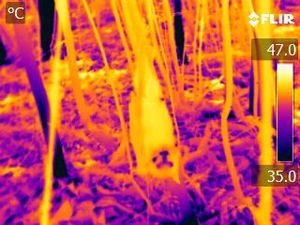Australian flying fox die-offs facts for kids
Imagine a really hot day, so hot that it's dangerous for animals. In Australia, tens of thousands of flying foxes, which are a type of large bat, have died because of extreme heat waves. These events are very sad to see. They show us how much animals can suffer from heat stress when temperatures get too high. These deaths are a big problem for flying foxes. They also highlight how climate change can affect animals' lives, how many there are, and if they can survive. Flying foxes are important because they help the environment by spreading seeds and pollinating plants.
Contents
Flying Fox Species Affected by Heat
Extreme heat events have affected two main types of Australian flying foxes:
- The grey-headed flying fox (Pteropus poliocephalus)
- The black flying fox (P. alecto)
When both types of flying foxes live together, the black flying fox often suffers more deaths. However, the grey-headed flying fox lives in areas that get much hotter. This means that overall, many more grey-headed flying foxes have died from heat than black flying foxes. Sometimes, the spectacled flying fox (Pteropus conspicillatus) is also affected. This is a big worry because this species is already endangered.
How Heat Affects Flying Fox Groups
When it gets very hot, young flying foxes and mothers who are feeding their babies are most at risk. They are often the first to die. However, any flying fox, no matter its age or if it's male or female, can be affected by extreme heat.
How Flying Foxes Try to Cool Down
When temperatures rise, flying foxes try different ways to cool themselves down. This is called thermoregulation. Here's what they do:
- They fan their wings to create a breeze.
- They try to find shady spots and huddle together to share shade.
- They pant, like a dog, to release heat.
- They salivate, which means they produce a lot of spit. They spread this spit on their bodies to help cool down as it evaporates.
If it gets too hot, these methods stop working. Then, you might find sick or dead bats at the bottom of trees, often in piles.
History of Flying Fox Deaths in Australia
Over the years, there have been many times when large numbers of flying foxes have died in Australia due to extreme heat. For example, in January 2014, over 100,000 grey-headed and black flying foxes died in Queensland. Another big event happened in November 2018, when between 33,000 and 40,000 spectacled and black flying foxes died in Queensland. These events show how serious the problem of heat stress is for these animals.
See Also
- ARKive – images and movies of the grey-headed flying-fox (Pteropus poliocephalus)


